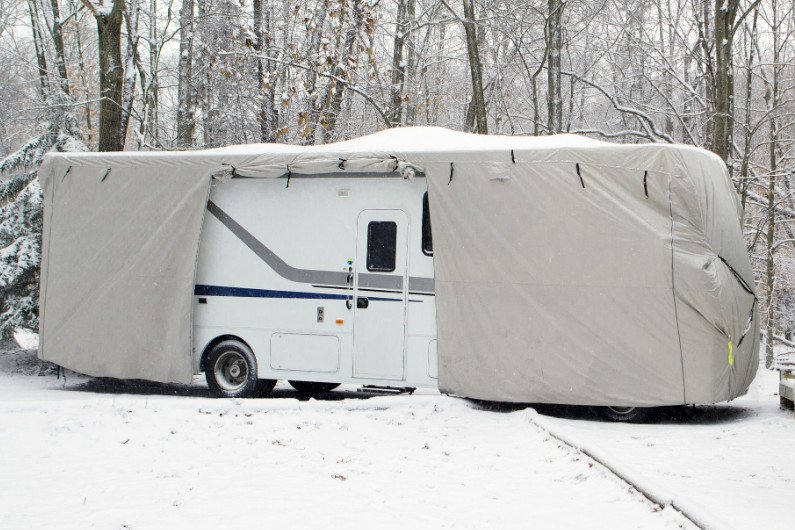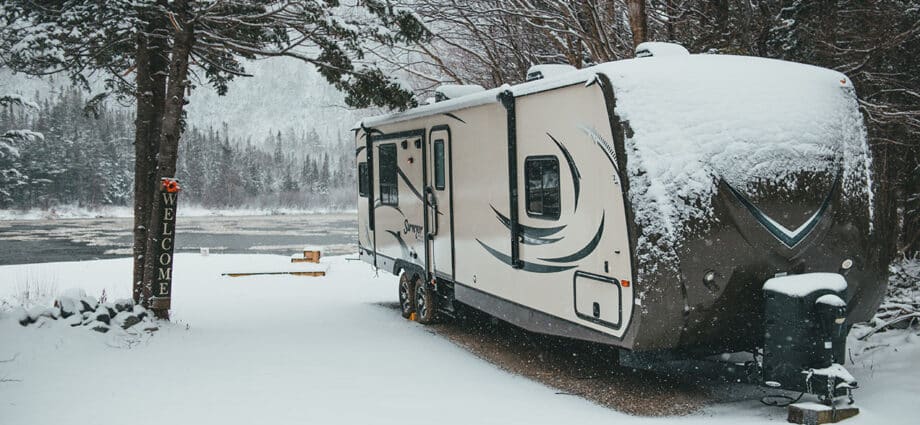Winterizing RV for Winter
To winterize an RV for the winter, there are a few steps you should take to ensure that the vehicle is protected from the cold weather.
Make sure all of the systems are properly maintained. Activities
These steps include:
- Drain all of the water from the RV’s plumbing system, including the fresh water tank, grey water tank, and black water tank.
- Add RV-specific antifreeze to the plumbing system to protect against freezing temperatures.
- Disconnect and remove the RV’s battery and store it in a warm place.
- Cover the RV with a weatherproof cover to protect it from snow and ice.
- If the RV is stored outside, elevate the vehicle’s tires off the ground to prevent them from freezing to the ground.
- Clean the RV’s interior and exterior, and make sure that all windows and doors are properly sealed to prevent drafts.
- Run the RV’s furnace or heating system for a few minutes each month to keep the interior warm and prevent condensation from forming.
It is also important to check for any leaks or damage before storing it for the winter. Make sure that all appliances are in good working order.
Winterizing RV for Winter Lake George Region
End of the Season
Winterizing an RV is important because it helps to protect the vehicle from damage caused by cold temperatures, snow, and ice.
When water in the plumbing system, appliances, and other systems freeze.
It can cause damage to the pipes, valves, and other components.
If not properly winterized, the water in the tanks can expand and burst the pipes or crack the tanks.
Additionally, the appliances like refrigerator, water heater, furnace and others may not work properly.
Protect them from freezing temperatures.
By properly winterizing your RV, you can prevent damage to the plumbing and other systems.
It can be costly and time-consuming to repair.
It also helps to protect the interior of the RV from mold, mildew, and other forms of damage caused by the cold and damp.
Storing the RV in a covered and elevated location also helps to prevent damage from falling snow and ice.
By disconnecting the battery, you can prevent it from freezing or being drained.
Overall, winterizing your RV is an important step in maintaining the vehicle and protecting your investment.
It also ensures that your RV is ready for use when spring comes around. Winterizing RV for Winter
How Much Does It Cost to Have My RV Winterized?
The cost of winterizing an RV can vary depending on a number of factors, such as the location of the RV, the type of RV, and the services that are required.
A basic winterization service typically includes draining the water tanks, adding RV-specific antifreeze to the plumbing system.
Disconnect the battery.
This type of service can cost anywhere from $50 to $150, depending on the RV and the location.
If your RV requires additional services, such as repairing leaks or damage, the cost can increase.
For example, if the RV’s water heater, refrigerator, or furnace need repairs or maintenance, this can add to the cost of winterizing the RV.
If you want to store your RV in a indoor storage facility it can cost around $200 to $400 per month.
If you want to store it in an outdoor storage facility it can cost around $50 to $150 per month.
Overall, the cost of winterizing an RV can range from a few hundred dollars to several thousand dollars.
Depending on the services that are required.
It’s always good to get quotes from different RV repair shops and compare the prices, as well as their reputation for quality services.
Winterizing RV for Winter
Winterizing RV for Winter – Should I Cover My RV for Winter?
Covering an RV for the winter can help protect it from damage caused by snow and ice, as well as from UV rays and dust.
Also, other environmental factors.
A cover can also help to reduce the amount of cleaning and maintenance that is required when spring arrives.
There are different types of covers available for RVs, such as polypropylene covers, polyester covers and others. Lake George Region
Polypropylene covers are a good choice for mild winter climates, as they are lightweight and breathable.
Polyester covers are more heavy-duty and can withstand harsher winter weather.
When using a cover, it’s important to make sure that it fits properly and is securely fastened.
If the cover is too loose, it can allow snow and ice to accumulate underneath, which can cause damage to the RV.
Additionally, make sure to remove any debris, such as leaves, twigs and branches before covering it, so they won’t scratch or damage the paint.
It’s also important to note that covering an RV alone may not be enough to protect it from the harsh winter weather.
It’s also important to properly winterize the RV, as well as store it in a covered and elevated location, as I mentioned in previous answer.
Overall, covering an RV for the winter can be a good way to protect it from damage. I
t should not be used as a substitute for proper winterization and storage.
Winterizing RV for Winter

